The 2002 film Catch Me If You Can tells the supposedly true story of Frank Abagnale Jr., but though this conman did pretend to be a pilot and cash bad checks throughout the 1960s and '70s, there's no real evidence that he ever worked for the FBI or scammed his victims out of $2.5 million.
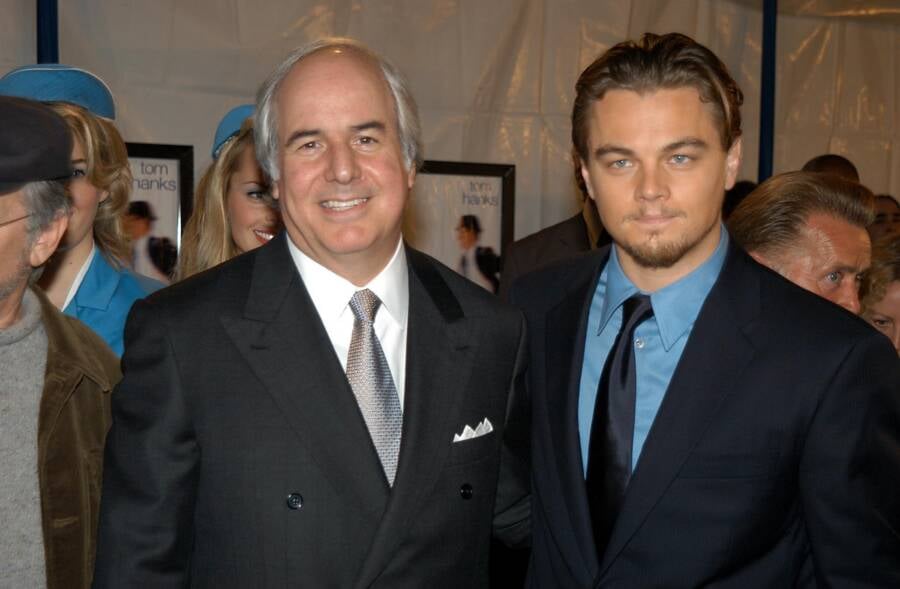
Jeff Kravitz/FilmMagic, Inc./Getty ImagesFrank Abagnale Jr. and Leonardo DiCaprio at the premiere of Catch Me If You Can in 2002. Recent evidence about the true story behind Catch Me If You Can suggests that Abagnale fabricated large portions of his memoir.
The 2002 film Catch Me If You Can follows Frank Abagnale Jr. as he poses as a pilot, doctor, and lawyer, makes millions off of fake checks, spends years running from the FBI, and then agrees to work undercover for the agency. The character is based on an actual conman who cashed bad checks throughout the 1960s and ’70s, but the true story behind Catch Me If You Can wasn’t quite so dramatic as depicted onscreen.
The movie is based on a memoir of the same name published by the real-life Abagnale in 1980, so in theory, it should be accurate. However, even before producers changed parts of the story to make it more thrilling for audiences, the source material had been highly exaggerated.
In 2020, journalist Alan C. Logan published The Greatest Hoax on Earth: Catching Truth, While We Can, a book that debunked Abagnale’s story. Logan spent years combing through records, and he failed to find much of anything that supported Abagnale’s claims. What’s more, he discovered that Abagnale had deliberately left out — and even outright lied about — other parts of his life, such as a prison stint that took place at the exact time he was supposedly committing his greatest crimes.
So, the true story of Catch Me If You Can isn’t what it appears to be onscreen — it’s a con all of its own.
The Many Petty Cons Of Frank Abagnale Jr.
Frank Abagnale Jr. started his grift in the mid-1960s, according to his own accounts. Born in 1948, the young New Yorker began carrying out various cons when he was just 15, around the same time his parents divorced. He was sent to a reform school and later spent three months in the U.S. Navy, but he went right back to his criminal ways upon his discharge in 1965.
He was arrested for petty larceny in February 1965, vagrancy the following month, and car theft in June. Because 17-year-old Abagnale was still a minor at the time of the car theft charges, he was released to his father, and that’s when he began impersonating a pilot. He even told his hometown media that he’d “graduated from the American Airlines school as the top New York state student,” as the Mount Vernon Argus reported on July 7, 1965.
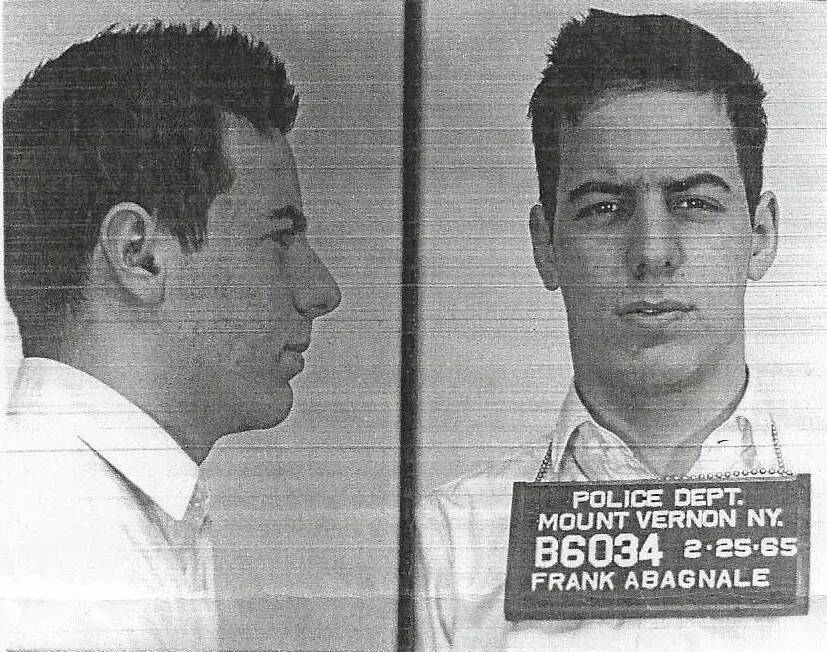
Mount Vernon Police DepartmentTeenage Frank Abagnale Jr.’s booking photo.
A week later, Abagnale was arrested once again for forging $350 worth of stolen checks. He spent the next three years in prison, and upon his release in late 1968, he pretended to be a pilot and headed to Louisiana. After less than two months there, he was apprehended for vagrancy, theft, forgery, and the possession of falsified airline employee identification after locals caught onto him.
He was convicted in June 1969 and sentenced to 12 years of probation — but he decided to flee to Europe. And while much of the true story behind Catch Me If You Can was exaggerated for the book and screenplay, Abagnale’s arrest in France really did happen.
Frank Abagnale Jr. was apprehended in Montpellier, France, in September 1969. He spent three months in a French prison on charges of theft, was extradited to Sweden to serve two months for previously defrauding two families there, and was then deported to the U.S.
Back in America, Abagnale continued with his previous cons, and he was ultimately arrested once more in November 1970. This time, he was sentenced to 12 years behind bars for forging checks and escaping from custody, though he ultimately served less than four years in total. He was released for the final time in 1974 — and that’s when he began crafting the story that would become a Spielberg film.
So, how exactly does the real story of Catch Me If You Can differ from the movie?
The Surprising True Story Of ‘Catch Me If You Can’
Despite Frank Abagnale Jr.’s many early arrests, Spielberg’s 2002 film only shows the 1969 apprehension in France. In fact, in public speaking engagements and interviews, Abagnale has reportedly claimed that he was only arrested that once.
The movie also had to play with the timeline of actual events to account for its exaggerations. Onscreen, Abagnale (portrayed by Leonardo DiCaprio) is arrested in France in 1967. This is likely because the real-life Abagnale was in prison between 1965 and 1968 — not pretending to be a Pan American pilot, passing the Louisiana State Bar exam, posing as a doctor, and traveling across the world to flee from the FBI, as he claimed in his memoir.
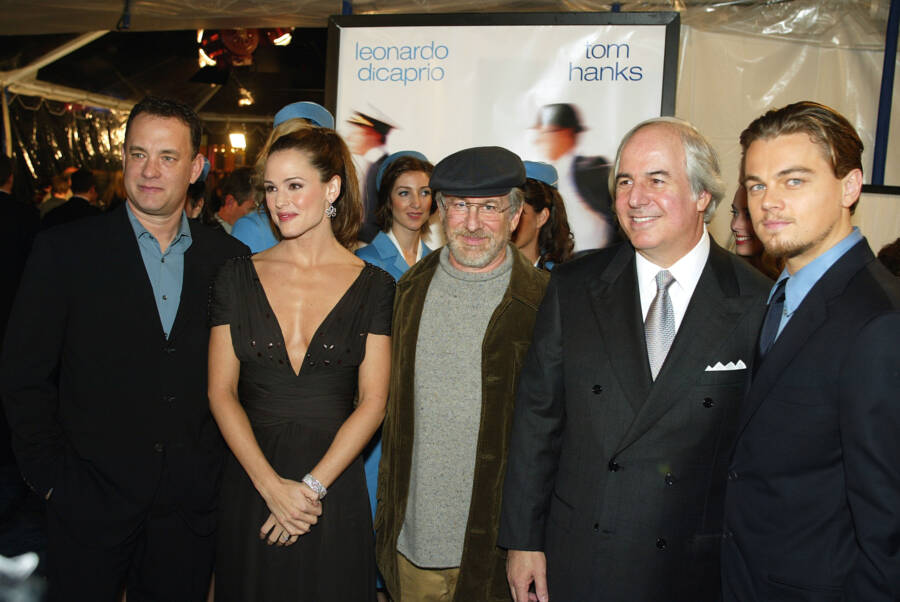
Kevin Winter/ImageDirect/Getty ImagesThe premiere of Catch Me If You Can in 2002. From left to right: Tom Hanks, Jennifer Garner, Steven Spielberg, Frank Abagnale Jr., and Leonardo DiCaprio .
According to Abagnale, during this purported long con, he flew more than one million miles, visited 26 countries, and cashed $2.5 million in bad checks. However, there’s no proof that most of this ever happened.
Alan C. Logan began investigating the true story behind Catch Me If You Can around 2020, though he’d had his doubts about Abagnale’s tales for years. He first saw the movie when it was released in 2002, and as he told WHYY-FM in 2021, “I remember just having this nagging feeling and that something just wasn’t quite right about it.”
When Logan set out to write The Greatest Hoax on Earth, he looked through old newspapers and public records in an attempt to verify Abagnale’s memoir and the events depicted onscreen. What he found was that Abagnale had seemingly exaggerated — or outright lied about — much of his story. There’s not even any proof that he took the Louisiana State Bar exam.
Logan also discovered that Abagnale’s most enthralling con — impersonating a commercial airline pilot — wasn’t nearly the years-long swindle he’d claimed. Instead, Logan told WHYY-FM, “What really happened was that, dressed as a TWA (Trans World Airlines) pilot, which he only did for a few weeks, he befriended a flight attendant called Paula Parks. He followed her all over the Eastern Seaboard, identified her work schedule through deceptive means, and essentially stalked the woman.”
Abagnale purportedly even showed up at her New Orleans apartment one time. She tried to get rid of him by explaining she was going to visit her family in Baton Rouge. Instead, Abagnale invited himself to join her.
“So Frank Abagnale meets her parents in Baton Rouge,” explained Logan. “Frank and Paula… part ways, and a few days later, Frank Abagnale shows back up at the house in Baton Rouge and said, ‘Hey, I’m Paula’s friend. Remember me? I’m on furlough as a pilot.’ And they invited him in out of kindness.”
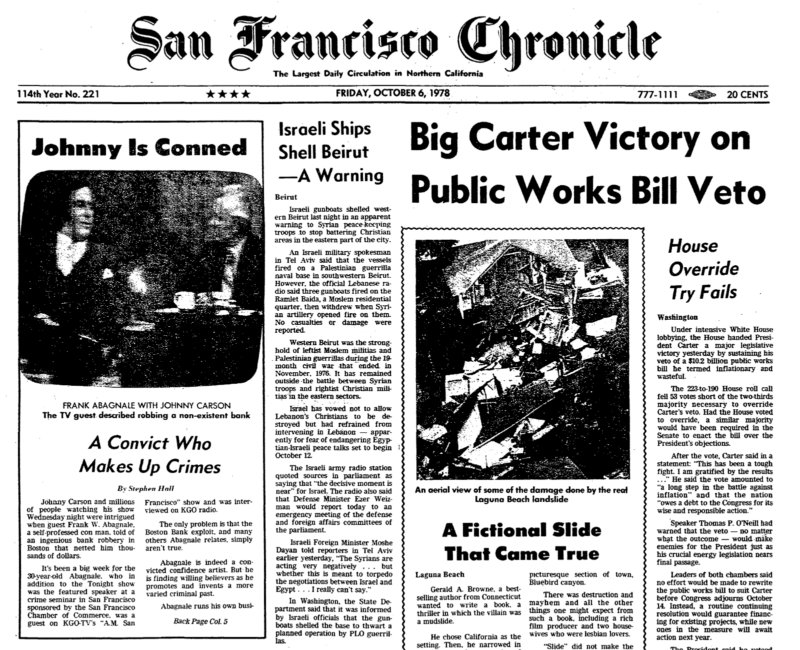
San Francisco ChronicleNewspapers like the San Francisco Chronicle had previously caught Abagnale in various lies, but the dots weren’t all connected until 2020.
The generous family introduced Abagnale to their high-profile friends. Meanwhile, he stole $1,200 worth of checks from them and various businesses in the area — in stark contradiction to Abagnale’s narrative of only ever defrauding hotels, banks, and airlines.
In addition, much of Catch Me If You Can follows Abagnale as he works undercover for the FBI, particularly Agent Carl Hanratty (Tom Hanks). There is no evidence that Abagnale ever worked for the agency, and Hanratty didn’t really exist. His character is based on several FBI agents, including Joseph Shea, whom Abagnale claimed to have befriended during his parole in the early 1970s. However, even this alleged relationship seems to be exaggerated. Instead, it seems that Abagnale and Shea didn’t even meet again until the late 1980s.
Sometime between his release from prison in 1974 and the publication of his book in 1980, Frank Abagnale Jr. decided that the real story of Catch Me If You Can wasn’t nearly exciting enough — and he started stretching the truth until it became a completely different tale altogether.
The True Legacy Of A Lifelong Conman
In The Greatest Hoax on Earth, Logan argued that Abagnale’s fabricated construct of himself began around 1977, after he was paroled and started nurturing his legacy through speaking engagements and a To Tell the Truth game show appearance — which was recreated for the film.
This led to nationally televised interviews on shows like The Tonight Show with Johnny Carson, which cemented Abagnale’s narrative for good. Various local newspapers did expose some of Abagnale’s fabrications, but a lack of communication between publications before the internet saw these discoveries buried.
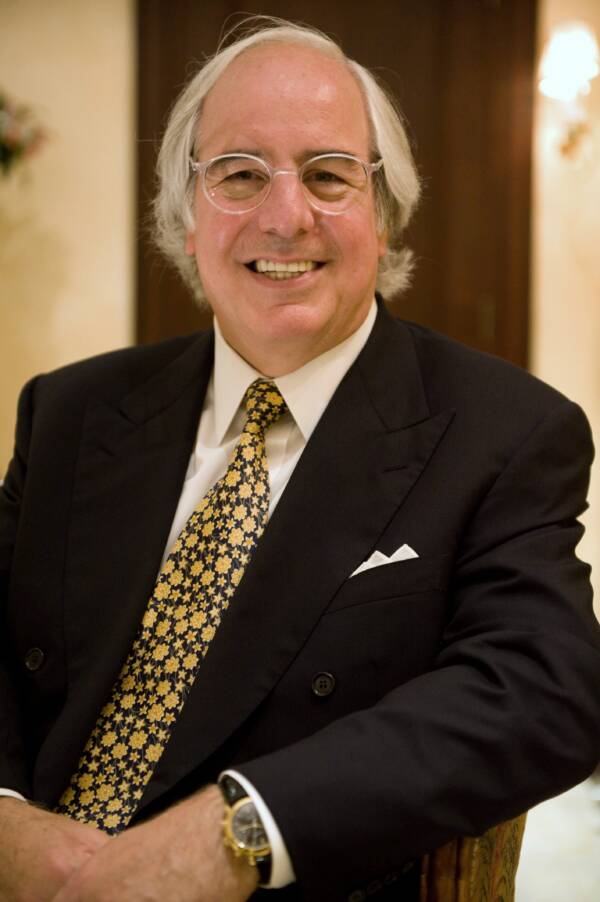
Abagnale & Associates/Wikimedia CommonsFrank Abagnale Jr. in 2008.
“So Abagnale’s narrative that between the ages of 16 and 20, he was on the run, chased all over the United States and even internationally by the FBI. This is completely fictitious,” said Logan. “Public records obtained by me show that he was confined for the most part in prison during those years.”
Logan even tracked down an interview between investigative journalist Ira Perry and Pan Am spokesperson Bruce Haxthausen from 1978 in which Perry asked about the company’s financial losses during the years Abagnale claimed to have been posing as a pilot — to shocking results.
“I’ve checked with the security people and everyone here, and it never happened,” said Haxthausen. “This is the first time we’ve heard of this, and we would have heard or at least remembered it if it happened. You don’t forget $2.5 million bad checks.”
Haxthausen continued, “I’d say this guy is as phony as a $3 bill.”
After reading about Frank Abagnale Jr. and the true story of Catch Me If You Can, discover nine of history’s biggest con artists and the scams they almost got away with. Then, learn about the ex-cop who rigged the McDonald’s Monopoly game for over a decade, raking in $24 million.





